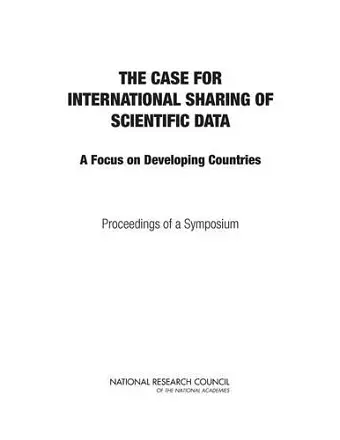The Case for International Sharing of Scientific Data
A Focus on Developing Countries: Proceedings of a Symposium
National Research Council author Policy and Global Affairs author Board on International Scientific Organizations author Board on Research Data and Information author Committee on the Case of International Sharing of Scientific Data: A Focus on Developing Countries author Paul F Uhlir editor Kathie Bailey Mathae editor
Format:Paperback
Publisher:National Academies Press
Published:11th Jan '13
Currently unavailable, and unfortunately no date known when it will be back

The theme of this international symposium is the promotion of greater sharing of scientific data for the benefit of research and broader development, particularly in the developing world. This is an extraordinarily important topic. Indeed, I have devoted much of my own career to matters related to the concept of openness. I had the opportunity to promote and help build the open courseware program at the Massachusetts Institute of Technology (MIT). This program has made the teaching materials for all 2,000 subjects taught at MIT available on the Web for anyone, anywhere, to use anytime at no cost. In countries where basic broadband was not available, we shipped it in on hard drives and compact disks. Its impact has been worldwide, but it has surely had the greatest impact on the developing world. I am also a trustee of a nonprofit organization named Ithaca that operates Journal Storage (JSTOR) and other entities that make scholarly information available at very low cost.
The culture of science has been international and open for centuries. Indeed, the scientific enterprise can only work when all information is open and accessible, because science works through critical analysis and replication of results. In recent years, as some scientific data, and especially technological data, have increased in economic value frequently has caused us to be far less open with information than business and free enterprise require us to be. Indeed, the worldwide shift to what is known as open innovation is strengthening every day.
Finally, since the end of World War II, the realities of modern military conflict and now terrorism have led governments to restrict information through classification. This is important, but I believe that we classify far too much information. The last thing we need today, at the beginning of the twenty-first century, is further arbitrary limitations on the free flow of scientific information, whether by policies established by governments and businesses, or by lack of information infrastructure. For all these reasons, the international sharing of scientific data is one of the topics of great interest here at the National Academies and has been the subject of many of our past reports. This is the primary reason why this symposium has been co-organized by the NRC's Policy and Global Affairs...
ISBN: 9780309301572
Dimensions: unknown
Weight: unknown
180 pages